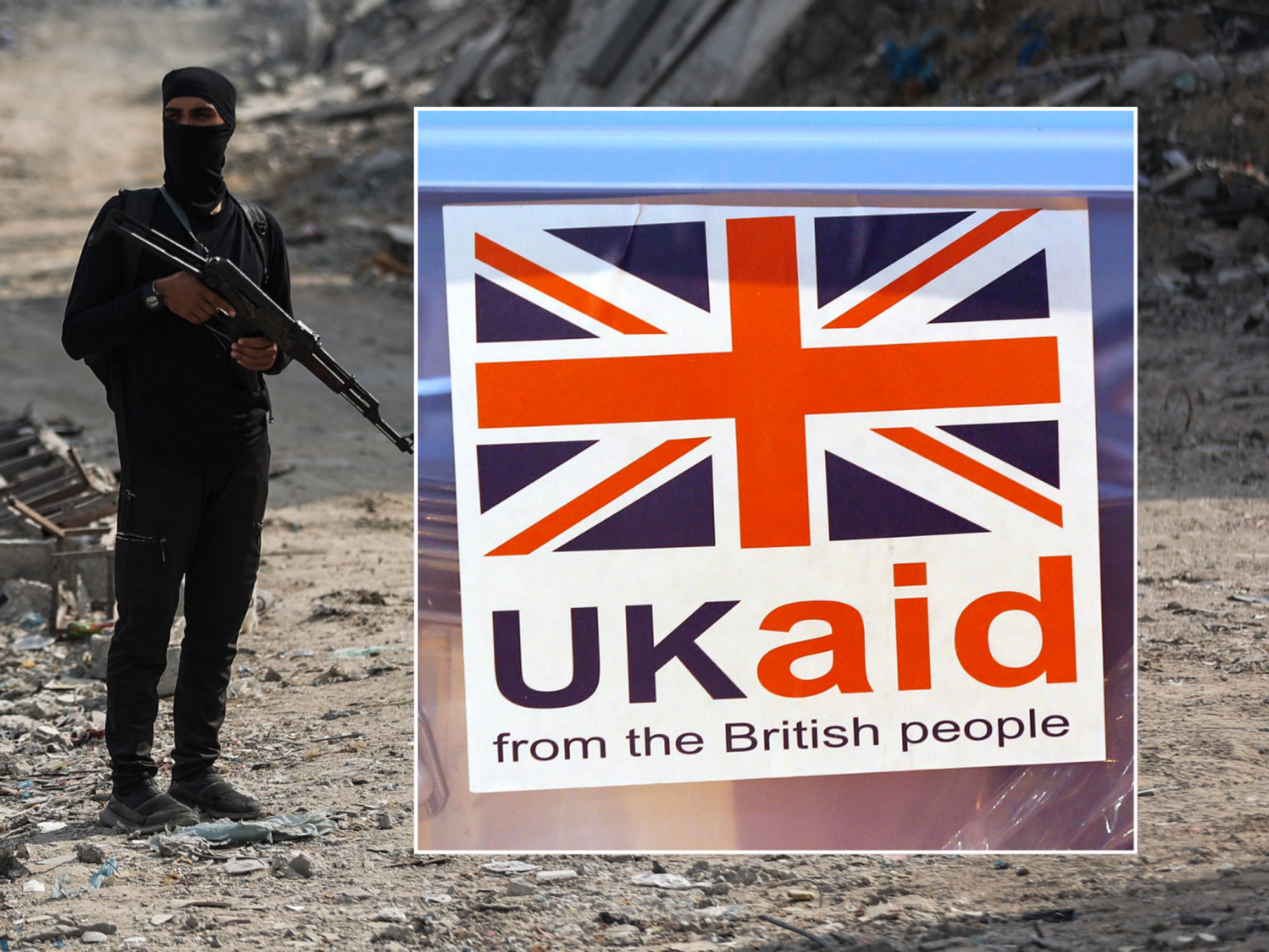Britain's boys are falling behind in a child development crisis fuelled by iPads - Miriam Cates
Miriam Cates was the Conservative MP for Penistone and Stocksbridge from 2019 to 2024
Don't Miss
Most Read
In a major speech on Thursday, Prime Minister Sir Keir Starmer set out six new ‘milestones’ for the Labour government. These include targets on housing, policing and NHS waiting times, all topics of concern to voters.
But one of Starmer’s ‘missions’ stood out from the others; his ambition for three quarters of four-year-olds to be ‘school ready’ by the end of this parliament highlighted an important issue that is not often discussed by politicians.
Britain is facing a growing crisis in child development that will have huge societal and economic repercussions if not addressed.
So, what exactly does it mean to be ‘school-ready’? There are several different definitions in circulation but in general terms, when a child starts school at the age of four, he or she is expected to be able to respond to and obey simple instructions, communicate verbally with others, put on coats and shoes independently, and be toilet trained.
These are normal developmental expectations that the majority of children should achieve well before the age of four. School-starters do not need to be able to hold a pen or count to 100; they will learn this in the classroom.
But crucially, they must have the skills, behaviours and self-control that enable them to thrive in a school setting. If a child can’t follow simple instructions or control their emotions, they have little chance of gaining much from formal education.
Alarmingly, vast numbers of children now start school without these basic skills. Around a third of four-year-olds are not ‘school-ready’ and research by Kindred Squared found that an astonishing 25% of school-starters this year were not toilet trained.
This has serious detrimental consequences for all children in a class. When teachers—who are trained and paid to educate our children—have to change nappies and clear up ‘accidents’ instead, hours and hours of learning are lost.
The situation has become so bad that many schools have had to redeploy teaching assistants from older year groups to provide physical support for four-year-olds, meaning that all children in school are losing out.
 Miriam Cates appearing on GB News | GB News
Miriam Cates appearing on GB News | GB News And as for those children who are not ‘school-ready’, their future is bleak indeed. Of course, it’s not too late at the age of four or five to learn to tie shoelaces or use the toilet, but it may be too late ever to gain good communication skills.
A child’s brain is programmed to learn language between the ages of six months and two years; once this window has closed, it is very difficult ever to catch up.
And children who demonstrate behavioural problems at the age of four are likely to have poor academic outcomes, with negative implications for future health, earnings and happiness.
Tragically, if a four-year-old’s parents have not yet tried or succeeded in training him to use the toilet, it is unlikely that they will succeed in training him in the other essential skills he will need as he grows up.
The sad fact is that children who are not ‘school-ready’ at the age of four will probably lag behind their whole lives.
When I was a child, parents weren’t allowed to send their sons or daughters to school if they weren’t toilet trained. Yet primary school teachers attest to a rapid decline in school readiness over the last decade. So how have we got to this point?
There are a number of contributing factors. Parenting children in the early years is not easy. It is physically demanding work–waking up in the night to feed babies, washing, dressing, protecting, and supervising are all time-intensive aspects of mother- and fatherhood.
Small children also need lots of face-to-face interaction, play and physical activity if their bodies and brains are to develop as they should. This is hard work even in a stable couple relationship, where both mother and father share responsibility.
But in single parent households it becomes very challenging indeed, especially where that lone adult is also responsible for bringing in income and doing all the chores.
Family breakdown rates in the UK are extraordinarily high, and the UK is now an outlier among Western nations in terms of the number of babies born each year to mothers who are unpartnered.
Single parents do an extraordinary job, but it is much more difficult for those parenting alone to give their child the best start in life.
The cost-of-living crisis has also taken its toll. It is now impossible for ordinary families to survive on one income, meaning that fewer and fewer mothers have the luxury of taking time away from the paid workforce in the early years.
Consequently, more toddlers are now in institutional childcare where, despite skilled and dedicated nursery staff, they don’t receive the one-to-one focussed attention that they would at home. Importantly, nurseries generally don’t offer potty training so parents must take time off work to do this, if at all.
Parenting styles have also changed, and many mums and dads are now reluctant to do—or not do—anything that might upset their child. This is of course understandable; seeing your child cry is a painful experience.
But giving children what they want all the time and avoiding situations they might find challenging is enormously damaging—it denies children the opportunity to learn impulse-control and emotional regulation, two virtues without which it is very difficult to succeed in life.
Teachers report that some children now arrive at school having never heard the word ‘no’ and remark that it is almost impossible to separate some pupils from their iPads.
Which brings us on to another extraordinary change. Twenty years ago, no child had ever seen an iPad.
Yet according to Ofcom a quarter of three and four-year olds now own their own smartphone. It’s now common to see toddlers—even babies—glued to tiny screens.
Recently I was walking with my family around a reservoir in the beautiful Peak District when we passed a couple pushing a baby of around nine months old in a pram. Instead of smiling at her parents or looking at the mountains, trees and wildlife, she was holding an iPhone four inches from her face.
LATEST MEMBERSHIP OPINION:
 Bev Turner calls Gen Z 'tech zombies' | GETTY / GB NEWS
Bev Turner calls Gen Z 'tech zombies' | GETTY / GB NEWS Every hour that an infant spends mindlessly consuming digital content is an hour not spent exploring and engaging in real world experiences that their brains are expecting to encounter.
Research shows that toddlers who spend more time on devices learn fewer adult words. Children who have more than seven hours of screen time a day may experience thinning of the brain's cortex, the area of the brain related to critical thinking and reasoning.
The impact of screens on young children is fast becoming a public health emergency. Experts recommend that babies should have no screen time at all until the age of two, and just thirty minutes a day from age two to five.
Yet the average British two-year-old now spends two and a half hours a day online. If the Prime Minister is serious about improving school readiness, he should start with a major national campaign to warn parents of the dangers of screen time for pre-school children.
In tackling the epidemic of delayed childhood development, the Prime Minister faces an additional complicating factor.
When it comes to school readiness, the problem seems much worse for boys than girls.
Although the evidence for pre-school children is currently mostly anecdotal, the available information shows a stark divide between the sexes. After one year in the classroom, 75% of girls hit expected learning and development targets compared to just 67% of boys.
In fact, boys now fall behind at every age and stage of education. And for the first time ever, 18–24-year-old men are more likely to be not in education, employment or training than their female peers.
Something is going seriously wrong for our boys. That’s why today the Centre for Social Justice—where I am a Senior Fellow—is launching a major new research project, ‘The Lost Boys’, to investigate what can be done to get British boys back on track.
The Prime Minister is absolutely right to focus his attention on the Early Years, and I believe the school readiness target is the most important of all of his six milestones.
Our future as a nation—the strength of society and the economy—depends on our children getting a good start in life.
We can blame parents, teachers, phones and government cuts as much as we like for children falling behind, but what matters is that we do something about it.
The Prime Minister has many critics, but if he succeeds in reversing the crisis in child development, he will have at least one legacy to be proud of.











